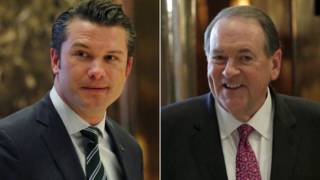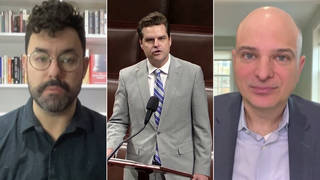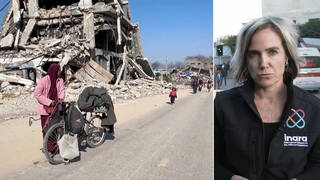
Related
Guests
- Annie Petsonkinternational counsel with Environmental Defense, a leading national environmental advocacy organization. She has participated in the development of climate policy since the inception of the climate treaty talks and works to develop international laws that provide economic incentives for environmental protection. Annie Petsonk supports carbon trading.
- Daphne Wyshamfellow at the Institute for Policy Studies. She is also the founder and co-director of the Sustainable Energy and Economy Network and a member of the Durban Group for Climate Justice. Her research drew attention to the disproportionate ratio of fossil fuel investments by international financial institutions like the World Bank. Daphne Wysham is opposed to carbon trading.
The Senate Environment and Public Works Committee will vote today on a bill promoting carbon trading, which sets greenhouse gas emissions limits and allowances for each industry and then creates a system to trade the allowances. Critics argue that carbon trading actually delays the crucial process of big polluters reducing their emissions. We host a debate between Annie Petsonk of Environmental Defense and Daphne Wysham of the Institute for Policy Studies. [includes rush transcript]
Transcript
AMY GOODMAN: We turn now to carbon trading. The Senate Environment and Public Works Committee will vote today on climate change legislation written by Senators Joseph Lieberman and John Warner. The bill is called “America’s Climate Security Act.” It aims to combat global warming by using a cap-and-trade system popularly known as carbon trading. This involves setting greenhouse gas emissions limits and allowances for each industry and then creating a system to trade the allowances.
Under the Kyoto Protocol, countries can trade emissions credits and companies can earn credits by paying for emissions-reducing and clean energy projects in developing countries. Despite the U.S. government’s opposition to the Kyoto Protocol, California, New York and New Jersey embraced carbon trading Tuesday, as they joined European governments, Canadian provinces, and New Zealand to launch a forum known as the International Carbon Action Partnership. Nobel Peace Prize winner Al Gore and institutions like the World Bank and the Pew Center on Global Climate Change also support carbon trading as a viable market-based solution to fight global warming. But critics argue carbon trading actually delays the crucial process of big polluters reducing their emissions.
Rising Tide North America is one organization that opposes carbon trading. Activists from the group disrupted a Carbon Markets Insights conference held in New York Monday. Posing as delegates, they took to the stage and denounced carbon trading as “a sham approach to the fossil fuel crisis.” This is a clip of their presentation at the conference.
ACTIVIST 1: We have a very special guest for all of you here as the cutting edge of market-based solutions to climate change. We present to you a deed to the next frontier that is literally over all of your heads.
ACTIVIST 2: “This indenture made on the 30th day of October in the year of our lord 2007 on behalf of the secretary of the sky bestows the full and rightful ownership of all parts of the atmosphere to the Carbon Traitors of Carbon Market Insights.” Generations of the future —
ACTIVIST 1: —- are begging you now -—
ACTIVIST 2: —- renounce this treachery -—
ACTIVIST 1: — for this [inaudible]. So sick this idea, offset your illusion.
ACTIVISTS 1 & 2: There’s no market-based fix for offset pollutions.
AMY GOODMAN: Protesters, or as they call themselves “Greenwash guerrillas” from Rising Tide North America, led away after intervening at the carbon trading expo in New York.
Well, today, we host a debate on carbon trading. Joining me here in Washington, D.C., two environmentalists, both committed to fighting global warming. Annie Petsonk is international counsel with Environmental Defense, a leading national environmental advocacy group. She has participated in the development of climate policy since the inception of the climate treaty talks and works to develop international laws that provide economic incentives for environmental protection. Annie Petsonk supports carbon trading. Daphne Wysham is a fellow at the Institute for Policy Studies. She is also the founder and co-director of the Sustainable Energy and Economy Network and a member of the Durban Group for Climate Justice. Her research drew attention to the disproportionate ratio of fossil fuel investments by international financial institutions like the World Bank. Daphne Wysham is opposed to carbon trading. We welcome you both to Democracy Now!
Annie, why don’t you start off by saying why you support carbon trading? And explain it in the process.
ANNIE PETSONK: The global warming problem is an urgent one, and we don’t have time to continue putting global warming pollution into the atmosphere. If we want to get countries, companies and local communities to look for and implement effective opportunities to cut greenhouse gas emissions, wherever they can find them — in the home, in the office, in the school — we’ve got to give people economic incentives so that it becomes in their financial self-interest to cut global warming pollution now. That’s what carbon trading does. Implemented effectively, it can be a huge help, along with other policies, in getting our nation to step up to the plate, take some leadership and tackle this problem.
AMY GOODMAN: But explain exactly how it works.
ANNIE PETSONK: Sure. In cap-and-trade, every polluter is given a mandatory limit on their greenhouse gas emissions. You get a certain amount of pollution; that’s all you’re allowed to emit. Essentially, the government opens a bank account for you and puts a certain amount of allowances to emit pollution in your bank account. If you can find a way to reduce your pollution below your allowable level, you have some extra pollution allowances that you can save for the future or to sell to someone else. If someone comes to you and says, “Hey, I’ve got a great idea for how you can cut emissions,” you can implement that idea, save emissions and then essentially have a valuable commodity that will be increasing in value in the future, since we have to cut a lot more pollution in the future, in order to prevent global warming from really becoming dangerous. And that gives you an economic incentive to look wherever you can to find better, cheaper, faster ways of cutting global warming pollution. So you need two things: a mandatory cap on emissions, put there by government, and an incentive program that allows anybody to come up with better, cheaper, faster ways to cut pollution and make money.
AMY GOODMAN: Daphne Wysham, what’s your problem with it?
DAPHNE WYSHAM: Well, you know, this is a nice abstraction, but what we should be looking at is how carbon trading is playing out in reality. If you look at the EU emissions trading system that was up and running — has been up and running for several years, we see that emissions are actually up for greenhouse gas emissions, as are profits. Profits are up for the nuclear industry, for the coal industry, and the average consumer is paying more.
Now, the EU emissions trading system, they’ve begun to make changes in that system; however, essentially what carbon trading does is it turns the earth’s carbon cycling capacity into property that is to be bought and sold in a global market. And by turning carbon into a commodity, we’re essentially taking the earth’s ability to support a climate conducive to life and human societies and passing it into the same corporate hands that are destroying the climate.
So, you know, one of the problems with the parameters of the climate debate is that for too long NGOs have been sort of promoting solutions that have been operating in a vacuum of, you know, analysis of other issues, fundamental issues around who profits, who pays, democracy, power. All of these sorts of things are rarely debated. And as a result, we have a very narrow sort of political space in which we’re now discussing how we move forward on the issue of climate change.
AMY GOODMAN: But explain exactly how it works. I mean, ExxonMobil is given a certain amount of carbon credits, allowed to emit a certain amount of greenhouse gases, and if they want to do more, who do they trade with?
DAPHNE WYSHAM: Well, they can trade — it hasn’t taken place yet domestically, because we don’t — what we have is basically — the U.S. is not signatory to the Kyoto Protocol. But ExxonMobil can trade with itself, if it has operations in a developing country, eventually. For example, Chevron is now pushing for gas flare reduction projects in the Niger Delta to count as carbon credits under the CDM. Now, this is a process that’s illegal. It’s been illegal in Nigeria.
AMY GOODMAN: You mean the gas flares?
DAPHNE WYSHAM: The gas flaring, yeah. And the international community and other institutions have been putting pressure on Nigeria to stop this gas flaring. However, if this carbon credit moves forward as planned, Chevron and the World Bank and some other major international corporations will actually profit from reducing gas flares, essentially getting a profit for doing what should be illegal.
AMY GOODMAN: Annie Petsonk?
ANNIE PETSONK: We’ve had great experience with cap-and-trade for controlling air pollution in this country since 1990, when Congress passed the Clean Air Act amendments. We put a cap on acid rain pollution and adopted this kind of system to cut acid rain pollution from coal-fired power plants. So, in that program, we essentially put the training wheels on the bicycle and learned how to ride the bicycle. That program has cut acid rain pollution far faster than industry and many environmentalists predicted could be done. And it’s done so at a fraction of the cost that people projected.
Setting up a carbon trading system for the world and for the United States is more complicated. There are more polluters. I agree with Daphne that companies should not be allowed to get credit in a developing country which has no caps on emissions for doing what they were supposed to do anyway. That would be like me saying to you, “Amy, I was planning to eat some cheesecake next week, but I’m not going to eat as much cheesecake as I was actually planning to do. I was going to break my diet and eat a little extra. And I’ll sell you my extra cheesecake credits.” You would then ask me, “Oh, Annie, how much cheesecake were you actually planning to eat next week?” And, of course, I’ll tell you I was planning to eat it breakfast, lunch, and dinner and sell you my extra cheesecake credits for what I don’t actually eat. We don’t like that system. We don’t think it’s a workable system. And one of the reasons why we’re looking forward to the markup in the Senate Environment and Public Works Committee today is that the bill now being considered there doesn’t create that system. It’s better than that.
AMY GOODMAN: Daphne Wysham?
DAPHNE WYSHAM: I tend to disagree with that perception, as do quite a few number of groups. Friends of the Earth has recently produced an analysis on the windfall profits in the Lieberman-Warner global warming bill, and according to their calculations, 38 percent of the giveaways, the free giveaways in this bill, would benefit the fossil fuel industry over the lifetime of the program. That’s — and roughly $268 billion of that would go directly to the coal industry alone.
AMY GOODMAN: Explain what the giveaways are.
DAPHNE WYSHAM: Well, you know, one of the failures of the EU emissions trading system is that they essentially — the governments essentially gave the right to pollute to certain industries. They set the tap high, and as a result industry was able to emit as much as they had been emitting in the past and make a profit buying and selling these emissions rights. Similarly, in this — and there was no auctioning.
Now, in the current Lieberman-Warner bill, there is some auctioning, but about 50 percent of all of the permits are just being given away for free. Now, these permits are valuable. They are basically being turned into a commodity. So now what we have is essentially the most carbon-intensive of the fossil fuels, the coal industry, is one of the largest beneficiaries of the Lieberman-Warner bill. And an additional $522 billion will potentially go to what they call zero and low carbon energy technologies. Now, if we are optimistic, we would say, “Wonderful! That’s going to go to renewables.” However, the legislation is vague. It could go to either the fossil fuel industry for carbon capture and storage, which is a very expensive and unproven technology, or it could go to the nuclear energy. And that is not specifically ruled out in this legislation.
So we have problems with this also because it essentially is a tax on the working poor. It’s not a tax on the very corporations that are causing the problem.
AMY GOODMAN: How is it a tax on the working poor?
DAPHNE WYSHAM: Well, because we will see the windfall gains. Instead of having those go to, say, subsidize an increase in the price of power or to public transportation or to other incredibly important solutions to the climate problem, we will see billions and billions of dollars worth of profits going back to the very industries that are causing the problem.
AMY GOODMAN: Annie Petsonk?
ANNIE PETSONK: We believe that the Americas Climate Security Act that’s going to be voted on this morning in the Environment and Public Works Committee is a very good first step. Is it perfect? No. Are senators moving to improve it? Yes. Senator Lautenberg announced yesterday he wants to broaden the coverage of the bill so that more parts of the economy come under that cap on fossil fuel emissions. We think that’s a good thing. He’s also proposing to put into the bill a provision that says, let’s look at how much global warming we’re seeing. You know, the governors of the Southeast states are meeting today here in Washington to try to figure out what to do about their dwindling water resources in the face of the worst drought the Southeast has ever seen. We’ve got to act now; they recognize that.
AMY GOODMAN: Atlanta could run out of water.
ANNIE PETSONK: Atlanta could run out of water. So what Senator Lautenberg has proposed to do is to put a provision in the bill that requires Congress to keep looking back at the science and see: if those caps on pollution need to be tightened, it will tighten them. The bill does start out, for about half of the polluters who are covered, by making them purchase allowances, not get them for free. And over time, it increases the amount they have to purchase, and it reduces the amount that the government gives them for free. That’s a sensible approach. Could it be faster? Yes. But it gets us started, and that’s the most important thing, because we don’t have time to wait.
DAPHNE WYSHAM: Can I just — you know, I think it’s important to take some specific examples. I think it’s instructive to look at, for example, the World Bank, which I have been monitoring for over ten years now. Now, they have invested over 15 times as much in fossil fuels as renewable since 1992. Originally, it was a hundred to one. Now, they are getting into the carbon trading market. The U.S. Treasury back in 1997 said this is a clear conflict of interest for a financial institution to both profit from financing fossil fuels and profit from carbon trading. They’re actually charging somewhere on the order of 13 percent commission on all carbon trading transactions. Now, what the World Bank could have done and should have done instead of getting into the carbon trading market is they should have set a higher energy efficiency standard, they should have stopped subsidizing fossil fuels, they should at the very least be calculating their climate footprint, which they are not doing. So they’re calculating the carbon credits, but they’re not calculating the carbon debits.
Now, if you globalize that particular model and look at how that would play out with bank after bank, whether it’s Citibank or the European Bank for Reconstruction and Development or other public or private banks, you see how these banks are going to be gaming the system. They will be profiting from selling — from giving loans to the likes of Chevron, and then they’ll be profiting again from charging a commission on the CO2 that is captured from those operations in developing countries or potentially in the U.S.
So, you know, what I think people need to understand is, yes, the time is urgent. We need to take action very soon on this issue. However, we need to learn the lessons from the failures of the EU emissions trading system. And the bill that’s on the Senate floor this morning is not the best way to move forward. It’s a corporate giveaway, and we need to do better. Boxer needs to hear from people on this.
AMY GOODMAN: Last word, Annie Petsonk, on this. Is this just a corporate gift, a subsidy, a giveaway?
ANNIE PETSONK: If America doesn’t take the lead, beginning to tackle our global warming pollution — excuse me — other nations won’t either. I strongly support getting rid of fossil fuel subsidies for big coal-fired power plants in China and India and in the U.S. We’ve got to start. We cannot afford to delay. This bill is not a corporate subsidy or giveaway. It’s a first step in getting America on a track to a cleaner energy future and a safer climate.
AMY GOODMAN: Fifteen seconds, Daphne Wysham, then what’s your alternative, since you are so critical of this?
DAPHNE WYSHAM: Well, I think, you know, what we have is a political opportunity here. We know that the president is going to veto any kind of legislation that comes from the Senate. He has made clear his opposition to any kind of legislation —
AMY GOODMAN: Even Lieberman and Warner?
DAPHNE WYSHAM: Even Lieberman and Warner. So why aren’t the Democrats — why are they just — why are they kowtowing to Bush? Why aren’t they pushing forward the most aggressive piece of legislation that they can get as a benchmark and say this is what we’re going to be pushing for in the next administration? And, you know, we can do better. We should be debating these issues. We should be setting much more stringent targets, at least 80 percent below 1990 levels by 2050. This bill gets us nowhere near that. And so, that’s my concerns with it.
AMY GOODMAN: Daphne Wysham and Annie Petsonk, I want to thank you very much for being with us. Annie Petsonk of Environmental Defense, Daphne Wysham, thanks so much.
DAPHNE WYSHAM: Thank you.
ANNIE PETSONK: Thanks, Amy.












Media Options